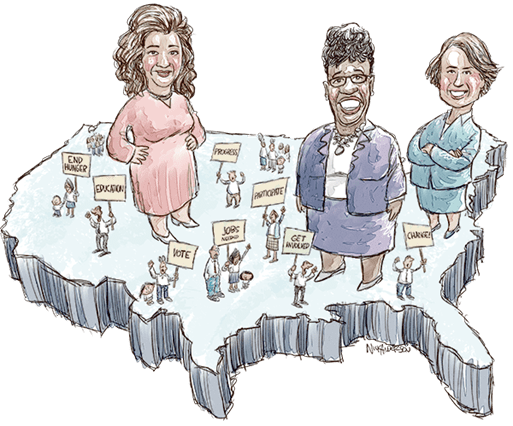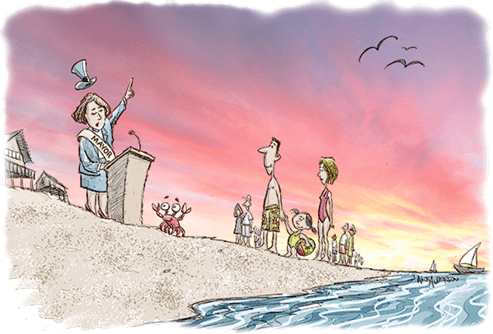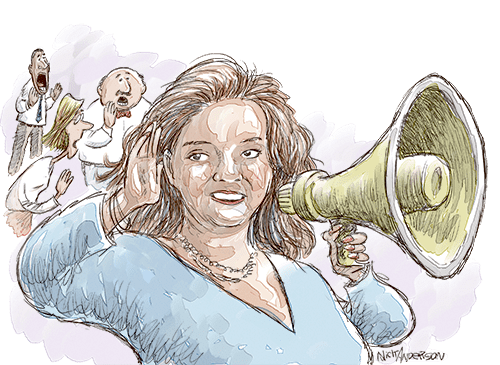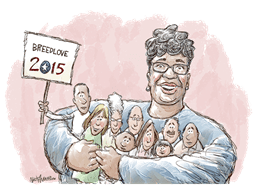Walden grads promote the positive in politics
Nearly 95% of Walden alumni say their degree program has helped them to advance positive social change in their communities, according to the 2015 Alumni Satisfaction Survey. We tend to think of social change as grand, sweeping initiatives—starting a nonprofit to end poverty in a developing country or donating millions of dollars to environmental causes.
But it doesn’t have to be. It can sometimes be as easy as casting a ballot on Election Day, or volunteering in the time leading up to it.
Politics may get a bad rap at times, but it’s the original social change method. The outcome of elections and the ensuing public policy decisions made by elected leaders affect the whole scope of our lives. Elections and politics pave the roads we drive on, build the schools we send our children to, and calculate the money in our paychecks.
How you vote, rallying your friends and neighbors to support a cause you believe in, or attending town hall meetings to voice your opinion may seem like small acts, but they create real change in our society. That’s the great promise of the free democracy in which we live: Every person, no matter the job title or income level, can be an agent of change.
Here, we’ve explored the ways our alumni are participating in the political process and leading their communities to positive social change. How will you find a way to engage this election year?

How you vote, rallying your friends and neighbors to support a cause you believe in, or attending town hall meetings to voice your opinion may seem like small acts, but they create real change in our society. That’s the great promise of the free democracy in which we live: Every person, no matter the job title or income level, can be an agent of change.
Here, we’ve explored the ways our alumni are participating in the political process and leading their communities to positive social change. How will you find a way to engage this election year?
The Accidental Mayor
Sometimes life causes a collision between private and political life. That’s exactly what happened to Dr. Sheila Davies ’14, ’09, a PhD in Public Policy and Administration and Master of Public Administration (MPA) graduate. Starting out her career with a bachelor’s degree in psychology and kinesiology, Davies did not anticipate she’d someday pursue two graduate degrees in public policy from Walden, be hired as a top county government official, and hold elected office.
Davies has served as mayor of Kill Devil Hills, North Carolina, since 2011–and works full time as director of public health for Dare County. That journey started when she put her kinesiology degree to work as her local YMCA’s executive director. There, she was given her first opportunities to interact with lawmakers firsthand. “I was fascinated by local politics and government,” she recalls.
After her tenure there, she expanded her service to the community. “My career took me to the government sector, working for the county health department for a substance abuse and treatment program. It became apparent that if I wanted to move up and grow, I needed to pursue higher education,” she recalls. “And I needed an online learning environment, because I was starting a family. That led me to Walden.”
After graduating with her MPA in 2009, she had both the real-world experience and the degree to become a leader in government. Yet she still never considered running for her community’s highest elected office. “I could see myself filling a commissioner seat someday, but I had no intention of running for mayor,” she says.

But the community had other plans for Davies. “Constituents’ frustration with the seated board of commissioners was growing. They were making decisions without citizen input,” she says. Kill Devil Hills is a small community with only 7,000 full-time residents that swells to 75,000 during the summer months; the Outer Banks town was struggling to balance the need to support a vibrant tourist economy while preserving a small-town beach feel.
On the table were plans to expand big-box development, a cause for great concern in the town. “The board had standing-room-only public comment sessions, where citizens were asking the board not to approve this public development. And the board would still vote their own way,” Davies says. “The political climate was: 'The board just doesn’t care, and they’re not listening to citizens.’”
Soon, Davies was approached by a group of citizens who knew her work as the executive director of the YMCA and with the county health department. They asked her to run for mayor. She ran, she won, and she changed things.
“I ran on increasing citizen engagement, so one of the first things we did was start live-streaming all of our board meetings on TV,” Davies says. She also added more public forums for community input and gave time for public comment during council meetings. Her multiple re- elections are proof that it’s working: She’s restoring voters’ faith in local leadership and increasing citizen access to decision-makers. And there’s no more direct of a democracy than the one she experiences every day.
“I love being a mayor in a small community,” she says. “I’ll be shopping in the grocery store and someone will pull their cart up right beside me and ask, 'What’s going on with this? Can you look into this for me?’ ”
The Political Junkie
“By the time I was in high school, I knew I wanted to be involved in political campaigns,” says Dr. Clarissa Arellano ’08, a PhD in Public Policy and Administration graduate and public policy expert. “At our dinner table growing up, we talked politics, we talked smack. It was in my veins!”
Arellano is part of the backstage world of politics, working the levers of our democracy: government affairs. The professionals in this industry have many job titles, but they all work to support elected leaders and to advance voter engagement.
As the director of government affairs, media, and public policy for the Pikes Peak Association of Realtors in Colorado, Arellano educates members about the political issues that affect them. She stays on top of developments at the local, state, and federal levels and coordinates responses to rules or legislation.Currently, she’s advocating for an ordinance in Colorado Springs that would make condominiums and other multi-tenant dwellings easier to buy. “Multi-family dwellings are a key point of entry to the market,” she explains. Though they are cheaper than single-family homes in Colorado, developers—not individuals—buy most of them. That’s bad news for first-time homebuyers and for the real estate business.
Her job is to find out what’s causing the situation and work with political leaders to fix it. Currently, that includes coordinating efforts as part of a coalition to testify in front of city councils statewide to bring valuable data to elected leaders. One by one, the coalition presents its case. It’s a painstaking process, but it works.

Arellano is also the go-to expert on government questions for association members, who sometimes call her in a panic. “When the Affordable Care Act, also known as Obamacare, became law, we were bombarded with e-mails because there was a change in the structure for capital gains,” she says. It’s a huge issue for the Realtors® Arellano works with, because selling property is their entire business. “I have to let them know what affects them, and what doesn’t.”
Arellano is also extremely active in voting issues and was appointed chair of the Colorado Secretary of State’s Pilot Election Review Committee to analyze the potential implementation of a statewide voting system. It’s a process, she says, that’s getting a lot of attention. “The Colorado elections in November were watched nationally and internationally,” she says. “I’m an elections nerd, so I have loved every minute of that.”
People like Arellano are a one-stop-shop for getting things done politically. But she makes it clear that she’s not a politician.
“People ask me when I’m going to run for office, but that’s not my cup of tea! I love public policy and I love being behind the scenes,” she says. “I like my space. I like my privacy. So I don’t mind helping someone else get elected, but I don’t think you’ll see my name on the ballot anytime soon.”
Arellano has a challenge for her fellow Walden alumni. “Being a spectator in the process just doesn’t cut it,” she says.
The good news is Walden graduates are particularly influential in the realm of community engagement: The 2015 Alumni Satisfaction Survey showed that 64% of graduates surveyed said they volunteered in the past year. That’s more than double the national average of 25%, which the U.S. Bureau of Labor Statistics says is the lowest rate in more than a decade. But of that 64% from Walden, only 6% said they are involved in a political party or advocacy group.
“You have to be vested as a citizen and participate in whatever way you are able,” Arellano says. “Write a congressman. Go to the soup kitchen and get involved. Show that you care. Civic engagement is the most basic form of engagement.”
The Personal Politician
Win or lose, it’s how you play the game that counts. Valencia Breedlove ’07, an MPA graduate, learned that lesson firsthand when she recently finished running for her first public office as city councilmember in Decatur, Georgia.

An Expert’s Guide to Political Engagement
Dr. Samuel Williams ’14, a PhD in Public Policy and Administration graduate, is an expert on citizen engagement, having served in public policy roles in the White House as well as the private and nonprofit sectors.
Engage critically with the media
. It’s hard today to tell if the news you’re seeing is objective, and that’s where a Walden education makes a difference. “I read everything I can from different perspectives,” Williams says. “When you have a 24-hour news cycle, there’s a tendency to draw a conclusion based on what you just heard. Instead, store that away, and assess it later.” Reading letters to the editor in a major daily newspaper is one quick way to get a handle on both sides of an unfamiliar issue.
Determine the issues that are important to you.
Too often in an election cycle, the most-discussed issues aren’t the ones most important to your day-to-day life. Williams says the first step to making political change is determining your own priorities. “Issues like education, healthcare, the environment, and jobs. Public policy is important because it deals with quality-of-life issues, not just the bureaucratic issues of getting legislation passed,” he says.
Find a way to amplify your voice.
“Communications between elected officials and the citizen ensures the citizen’s voice is being heard, and also that the elected official understands what concerns their constituents have,” Williams says. “That’s the two-way engagement process.” Writing letters, attending town hall meetings, and meeting directly with elected officials all make a difference.
Don’t give up.
Williams is passionate about figuring out ways to sustain voter engagement; that’s the key to a well-functioning democracy. “When an election doesn’t go your way, realize you are one of many,” he says. “You do have an impact. Just keep communicating. That’s when we begin to make progress.”
“Because I was new to politics, everything was an eye-opener,” she says. “Getting your name out there is one of the hardest things there is. You’re constantly knocking on doors and going to community events. It’s very time consuming, but every moment counts when you’re running the race.”
In the end, Breedlove lost the election. “I came in third place—155 votes,” she says. But each of those votes represents a lot of work: talking to people, pounding the pavement, introducing herself and her vision to the community. So Breedlove is grateful for every single vote she received.
Determined to run again, she says this won’t be the last election with her name on the ticket. Her political resiliency isn’t surprising—she grew up with politics in her blood. Her grandfather was a city councilman in Terrell County, Georgia, and took her along for many of his official duties during her childhood. “I saw him go into homes and talk about how to end racism and work with seniors in the community,” Breedlove remembers.
She watched him open a senior center, mentor children, and feed the hungry in the community. “That was one of the things that inspired me to say, 'This is what I want to do one day,’ ” Breedlove says.
Formerly an American history teacher, Breedlove decided to pursue a degree in public policy to prepare herself for a career as a lawyer. “I wanted to get my master’s degree before going to law school,” she says. “I was the single parent of an infant, and I didn’t have the opportunity to go to a live classroom, so Walden was perfect for me.”
Now working as a probation officer in the DeKalb County Court, Breedlove sees the problems in her community that need to be fixed every day. Her run for office was intended to give a voice in the community for people like her—those who live and work in the city and want to be able to continue doing so for years to come. “I don’t want our seniors or our working families to be priced out,” she says.“I remember when I was in college, my great aunt called me and said things weren’t going the way she planned,” Breedlove says.“She said she couldn’t afford to continue living there. I was devastated.” Win or lose, Breedlove brought these personal stories with her to the election, giving her issues a voice at the table. It’s a powerful reminder that participating in the process is what’s important. “What drives me is the change. To make sure that our people—families, single parents—are able to see a positive change and be a voice for the community,” she says. “I want them to know that Breedlove is going to work to get them whatever’s needed. That’s why I’m going to run again.”
It’s Your Turn
Though Walden prepared these graduates for the world of politics, you needn’t be a graduate of the public policy program to effect social change through our American political system. Walden graduates have proven over and over that they take what they’ve learned and their unique view into our communities to make a change, driven by the desire to make the world a better place.
We can even inspire others to do the same. So vote. Volunteer in your community. Or maybe work for a cause or candidate you believe in. Democracy, like social change, can only happen if people like us take action.



